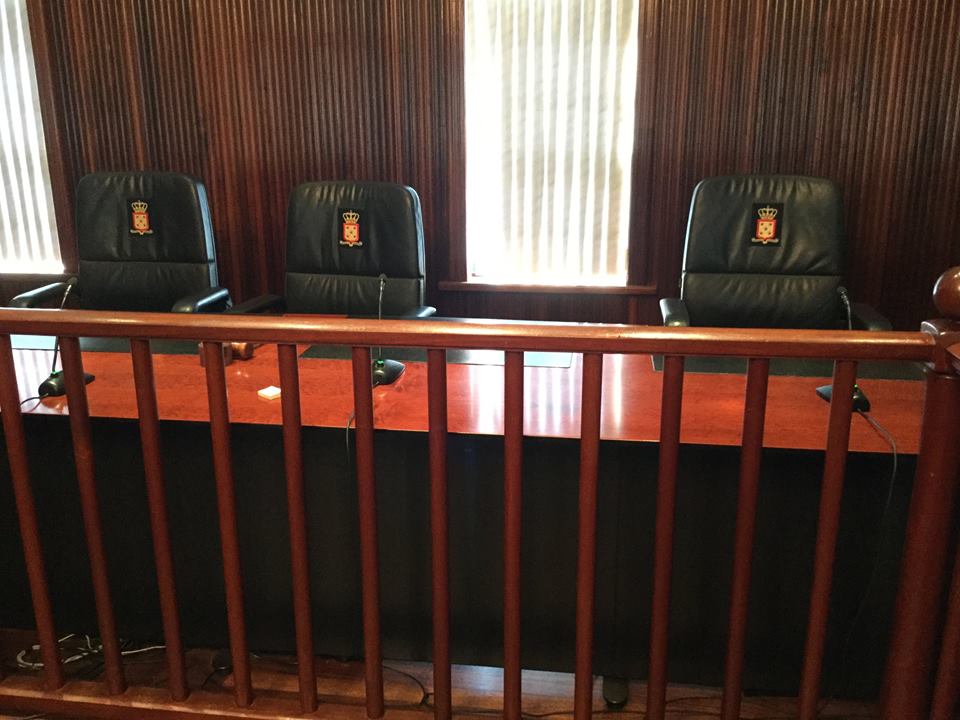Court gets around absence of pro bono laywers

PHILIPSBURG – In the absence of the pro bono lawyers who went on strike over a payment conflict with the government three weeks ago, the Court in First Instance blustered through a handful of criminal cases on Friday nonetheless.
The court took pro bono attorney Geert Hatzmann by surprise when it decided to handle the case of his client Kamal Hamilton and sentenced him to 9 months of imprisonment for firearm and marijuana possession. “Wow,” Hatzmann reacted after hearing about the sentence. “I take it that the court is aware that all pro bono lawyers are on strike and that their cases would be postponed.”
But the presiding judge was relentless: “That these attorneys are on strike is fine but they should still ask for a postponement,” he said. “That has not happened and therefore there is no reason to postpone this case.”
Hamilton was not present for the handling of his court case either. The public prosecutor said that the defendant had taken responsibility for the possession of the weapon and the drugs.
“There is however a relationship between the gun and the marijuana,” he said. “There are indications that this defendant was dealing and he had the gun because he thought others in his circles had guns too. The weapon was found in his house, he was not carrying it in public; that makes a difference.”
Because Hamilton had no criminal record, the prosecutor demanded 9 months of imprisonment; the judge agreed with this demand.
The first case of the morning, against 23-year old Samy Bendjelloul, was another story. The defendant did not show up and his attorney Sjamira Roseburg was on strike. Bendjelloul was found guilty of ill-treating a man who owed him money and was not paying, breaking the victim’s jaw in two places.
The public prosecutor demanded 6 months of imprisonment, but the court served a lower sentence: 4 months.
Two hours later Bendjelloul suddenly showed up and the court was lenient enough to redo the case. That worked well for the defendant, because this time he got off with a sentence of 240 hours of community service.
Chidelfi Joshua Emmanuel also got a good deal from the court. The 22-year old – charged with five (attempted) home burglaries had already spent 80 days in pretrial custody and postponing his case because of the absence of his striking attorney Safira Ibrahim would most likely move the trial date to after the summer.
Emmanuel told the court that he wanted a lawyer. “That is a pity, because then we cannot handle the case now and you have already been detained for 80 days,” the judge told him.
The judge then highlighted some details from a probation office report about the defendant, noting that he had confessed to the charges, that he is jobless, had a good upbringing and that his mother pays everything for him.
“He seems motivated to change his life,” the report stated. The probation office suggested community service instead of a prison sentence. “He is not better off in prison because he can easily be influenced.”
“It would be a pity if you had to go back to prison because of the strike,” the judge told the defendant. He then asked the prosecutor to present his case. “After that we can decide whether you are okay with it or that you want an attorney after all.”
The public prosecutor demanded 11 months of imprisonment, with 6 months conditional, 2 years of probation and 240 hours of community service. With such a sentence, Emmanuel would have to remain in jail for another 70 days.
The judge briefly withdrew to chambers to consider the case. When he came back he said that he had been considering whether the defendant should go back to jail or that the 80 days he spent behind bars is enough.
And the judge ruled that 80 days is indeed enough in this case. “The probation office report shows that there is something going on with you. You need guidance and working will help you.”
The court sentenced Emmanuel to 365 days of imprisonment, with 285 days conditional, 2 years of probation, 240 hours of community service and supervision by the probation office; this could include visits to Turning Point to deal with the defendant’s drug use.
“Don’t do anymore stupid things,” the judge admonished the young man. “Keep your hands off things that belong to other people and make something of your life. You have a mother who loves you and a brother who takes care of you.”























